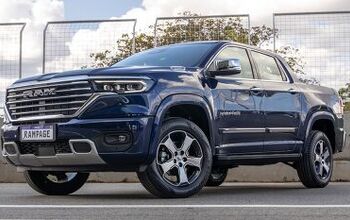Apple CEO Dubs Self-driving Car Program 'the Mother of All A.I. Projects'

Apple has been perpetually flip-flopping in terms of developing autonomous vehicles. In 2014, the company was rumored to have begun work on an autonomous electric car, codenamed “Project Titan,” with hundreds of employees devoted solely to its development.
Management issues and logistical problems impaired its progress, leading Apple to abandon the project. Since then, Bob Mansfield has fronted a renewed effort to focus on building an autonomous driving system rather than a complete car. At least, that was everyone’s best guess, as the company has been semi-secretive about its mission since day one.
That changed on Tuesday, when CEO Tim Cook confirmed that Apple does indeed have a self-driving development program. The chief executive even went so far as to call it “the mother of all A.I. projects.” That’s quite the claim to make, considering making the tech work on a car is half the battle and Apple has no practical experience building an autonomous vehicle.
“We’re focusing on autonomous systems,” Cook said in an interview on Bloomberg Television earlier this month. “It’s a core technology that we view as very important.”
He detailed his view of the future for the automotive industry as a combination of self-driving cars, electric vehicles, and ride-sharing. Apple plans to focus on autonomy, though some of Cook’s talk seemed to hint that the company hadn’t abandoned the notion of building an EV entirely. “It’s a marvelous experience not to stop at the filling station or the gas station,” Cook said.
However, the CEO’s penchant for not having to stop at the gas station — or the filing station, if you prefer — doesn’t indicate the company has any genuine plans to build a physical car. Cook just didn’t outright say that option was no longer on the table.
“We’ll see where it takes us,” he said. “We’re not really saying from a product point of view what we will do.”
It’s definitely too early for Apple to commit to anything. Despite having begun running its systems on at least one Lexus SUV, it has only recently gained an autonomous vehicle test permit to use in California. The company lags noticeably behind major automakers like Ford and General Motors, but is working on catching up.
A self-driving simulation group, which includes virtual reality expert Doug Bowman, has designed simulators that use VR to test Apple’s self-driving software. The company also invested one billion dollars into Didi Chuxing, the Chinese Uber, in 2016. Of course, none of this adds up to Apple being the first to achieve the fabled Level 5 Autonomy. It just proves it’s still a player and doesn’t want to be left out of the party.
“Clearly, one purpose of autonomous systems is self-driving cars — there are others. And we sort of see it as the mother all A.I. projects,” Cook told Bloomberg. “It’s probably one of the most difficult AI projects, actually, to work on. So autonomy is something that is incredibly exciting for us.”
[Image: iphonedigital/ Flickr ( CC BY-SA 2.0)]

A staunch consumer advocate tracking industry trends and regulation. Before joining TTAC, Matt spent a decade working for marketing and research firms based in NYC. Clients included several of the world’s largest automakers, global tire brands, and aftermarket part suppliers. Dissatisfied with the corporate world and resentful of having to wear suits everyday, he pivoted to writing about cars. Since then, that man has become an ardent supporter of the right-to-repair movement, been interviewed on the auto industry by national radio broadcasts, driven more rental cars than anyone ever should, participated in amateur rallying events, and received the requisite minimum training as sanctioned by the SCCA. Handy with a wrench, Matt grew up surrounded by Detroit auto workers and managed to get a pizza delivery job before he was legally eligible. He later found himself driving box trucks through Manhattan, guaranteeing future sympathy for actual truckers. He continues to conduct research pertaining to the automotive sector as an independent contractor and has since moved back to his native Michigan, closer to where the cars are born. A contrarian, Matt claims to prefer understeer — stating that front and all-wheel drive vehicles cater best to his driving style.
More by Matt Posky
Latest Car Reviews
Read moreLatest Product Reviews
Read moreRecent Comments
- SCE to AUX All that lift makes for an easy rollover of your $70k truck.
- SCE to AUX My son cross-shopped the RAV4 and Model Y, then bought the Y. To their surprise, they hated the RAV4.
- SCE to AUX I'm already driving the cheap EV (19 Ioniq EV).$30k MSRP in late 2018, $23k after subsidy at lease (no tax hassle)$549/year insurance$40 in electricity to drive 1000 miles/month66k miles, no range lossAffordable 16" tiresVirtually no maintenance expensesHyundai (for example) has dramatically cut prices on their EVs, so you can get a 361-mile Ioniq 6 in the high 30s right now.But ask me if I'd go to the Subaru brand if one was affordable, and the answer is no.
- David Murilee Martin, These Toyota Vans were absolute garbage. As the labor even basic service cost 400% as much as servicing a VW Vanagon or American minivan. A skilled Toyota tech would take about 2.5 hours just to change the air cleaner. Also they also broke often, as they overheated and warped the engine and boiled the automatic transmission...
- Marcr My wife and I mostly work from home (or use public transit), the kid is grown, and we no longer do road trips of more than 150 miles or so. Our one car mostly gets used for local errands and the occasional airport pickup. The first non-Tesla, non-Mini, non-Fiat, non-Kia/Hyundai, non-GM (I do have my biases) small fun-to-drive hatchback EV with 200+ mile range, instrument display behind the wheel where it belongs and actual knobs for oft-used functions for under $35K will get our money. What we really want is a proper 21st century equivalent of the original Honda Civic. The Volvo EX30 is close and may end up being the compromise choice.


































Comments
Join the conversation
Spot on. Our "current software QC methods" don't even catch all the simple logic and UI errors in modern software and web apps. For AI testing, we'll need psychologists and psychiatrists doing the testing.
I believe I saw Opie at the filling station today.